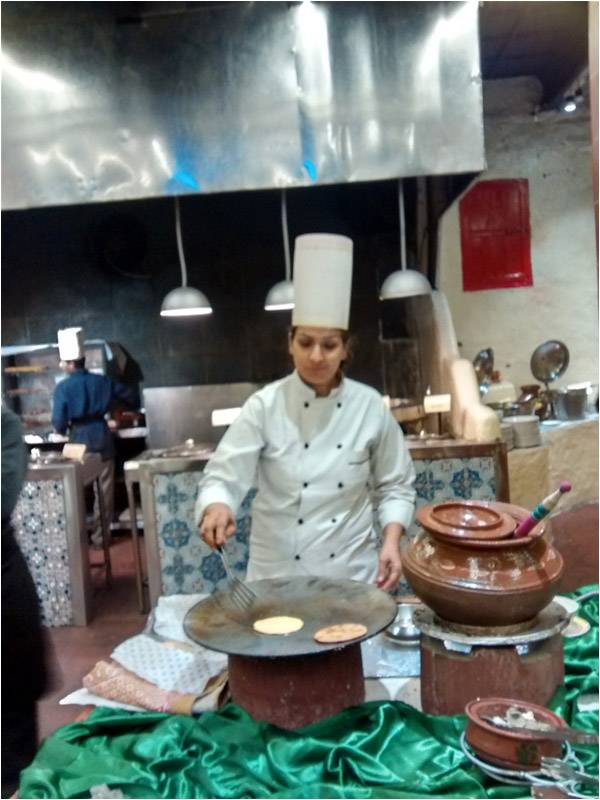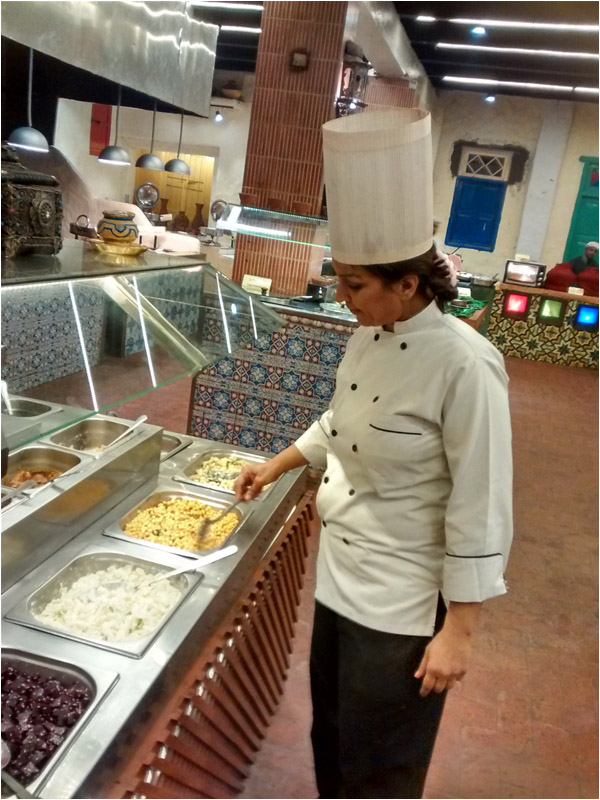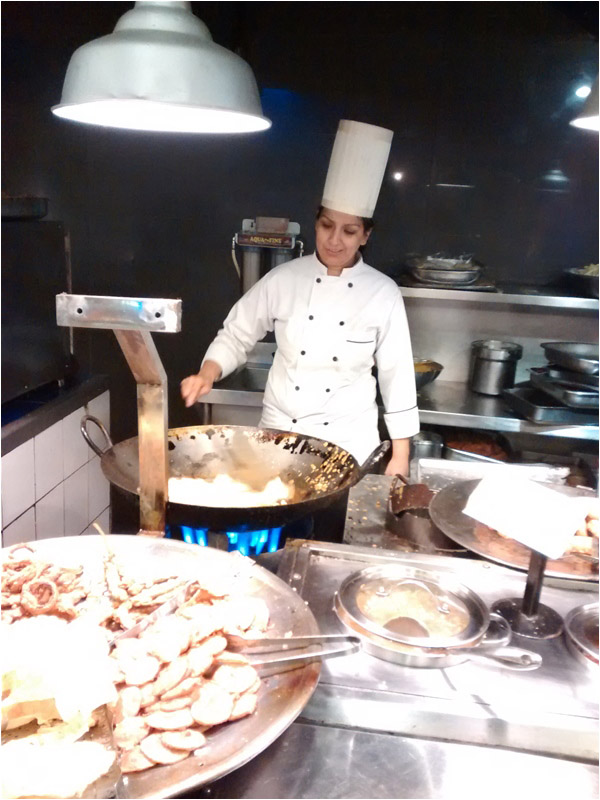
Returning from her job, 41-year-old Abida Malik, swiftly started taking care of her children’s needs who had been waiting for their mother in a small house in Lahore. Sitting among the scattered books her 7-year-old child ran to the door to welcome her mother. Abida is a chef at an upscale food joint, a position she has reached after a great degree of personal effort, and with a little help from friends, those being the oft-maligned ‘foreign agencies’ some of whom are truly turning around the lives of the country’s marginalized.
There is strong violation of labour laws and social security nets in Pakistan, primarily regarding female labour work within the informal sector. The International Labour Organization’s (ILO) international labour standards dictate a tripartite involvement of labourers, employers and governments to achieve goals such as the creation of work opportunities, income generation, stability, rights, the hearing of workers’ voices and opportunities for personal development. The Decent Work Agenda is an internationally distinguished framework for poverty reduction and balanced development which provides guidelines for establishing an economy that promotes investment, skill development, entrepreneurship and sustainable livelihoods. It recognizes and values the rights of all workers and employers to a secure and healthy workplace, income protection, work-life balance, and access to healthcare for all.

These guidelines are rarely ever followed in Pakistan where the bulk of the poor and vulnerable work in very difficult conditions for long hours and low wages, while safety nets and social protection networks are often inadequate or entirely absent. Since people cannot afford to be unemployed; and with no unemployment benefits from the state, they have no choice but to work in exploitative conditions.
Abida Malik narrates the story of how her marriage ended and her subsequent struggle as a single mother. After her divorce, her ordeal did not end as her father and brothers took over the role of dominant male members, calling the shots in her life.
Abida’s story is, however, not an uninterrupted cry of pain; she is living testament to what an indomitable spirit and a drive to improve one’s life can achieve. She set out to change her and her three children’s lives by cooking and selling food in different markets near already established roadside mobile food points. Even then it was difficult for her to make ends meet, and her children remained out of school. Through a stroke of luck she learnt of an opportunity to get training from ILO whose agenda is to promote gender equality through skill development leading to employment. ILO offered a chef course that Abida decided to enroll in.
Narrating her story further, she recalls how taxing the six month training period was without any surety of getting a job in the end. I sold my gold ring, furniture and even sewing machine to arrange the fee for the training course. That was a very difficult phase of my life. In those days I did not even have enough money to feed my family, but I knew the only way out was to upgrade my skills for a better future. Even after selling my household items I had to get loan to cover my training expenses. I was deeply worried about the education of my children”.
Financed by the Canadian International Development Agency, the GE4DE (Gender Equality for Decent Employment) is a five-year program started in July 2010 in a push to enhance gender mainstreaming through entrepreneurship. By enlisting workers and guaranteeing them skills-improvement to strengthen and promote sustainable livelihoods GE4DE has helped many women, says Frida Khan, National Project coordinator, ILO.

Command and control over the mobility of females is one of the key reasons for their vulnerability to poverty and abuse. Skill development and entrepreneurship are the ways to ensure they find the strength within themselves not to be exploited in either the domestic or professional sphere.
According to the Pakistan Employment Trends Report on achieving Millennium Development Goals, roughly six out of ten employed people in Pakistan are considered to be vulnerable, or “at risk of lacking decent work”. It is recognized that the large share of female vulnerability needs special attention.
“After training I found a job at Salt’n’Pepper Village as a chef. Today, I am proud to be an important part of the restaurant management. I finished the ILO training course with flying colors and stood second in the Entrepreneurship and Business Plan competition. I feel proud that today I am empowered and able to earn my livelihood independently. I feel passionate and strong being a mother and a bread winner”.
Women emancipation, however clichéd it may sound, is what leads to the trajectory of change and development. Poverty alleviation is a long-drawn process and without empowering women and turning them into employable and earning members of society, our goals of poverty alleviation cannot be substantially accomplished. ILO and other organizations working at the grassroots level are helping achieve this goal. However, the need is to expand the network and deploy more resources to reach out to a wider spectrum of the poverty-stricken population. It may appear difficult, but it is achievable if the government, multilateral agencies and private sector work hand in hand with shared objectives and plans.
Haroon Janjua tweets @JanjuaHaroon. He can also be reached at janjuaharoon01@gmail.com
There is strong violation of labour laws and social security nets in Pakistan, primarily regarding female labour work within the informal sector. The International Labour Organization’s (ILO) international labour standards dictate a tripartite involvement of labourers, employers and governments to achieve goals such as the creation of work opportunities, income generation, stability, rights, the hearing of workers’ voices and opportunities for personal development. The Decent Work Agenda is an internationally distinguished framework for poverty reduction and balanced development which provides guidelines for establishing an economy that promotes investment, skill development, entrepreneurship and sustainable livelihoods. It recognizes and values the rights of all workers and employers to a secure and healthy workplace, income protection, work-life balance, and access to healthcare for all.

These guidelines are rarely ever followed in Pakistan where the bulk of the poor and vulnerable work in very difficult conditions for long hours and low wages, while safety nets and social protection networks are often inadequate or entirely absent. Since people cannot afford to be unemployed; and with no unemployment benefits from the state, they have no choice but to work in exploitative conditions.
Abida Malik narrates the story of how her marriage ended and her subsequent struggle as a single mother. After her divorce, her ordeal did not end as her father and brothers took over the role of dominant male members, calling the shots in her life.
Through a stroke of luck she learnt of an opportunity to get training from ILO
Abida’s story is, however, not an uninterrupted cry of pain; she is living testament to what an indomitable spirit and a drive to improve one’s life can achieve. She set out to change her and her three children’s lives by cooking and selling food in different markets near already established roadside mobile food points. Even then it was difficult for her to make ends meet, and her children remained out of school. Through a stroke of luck she learnt of an opportunity to get training from ILO whose agenda is to promote gender equality through skill development leading to employment. ILO offered a chef course that Abida decided to enroll in.
Narrating her story further, she recalls how taxing the six month training period was without any surety of getting a job in the end. I sold my gold ring, furniture and even sewing machine to arrange the fee for the training course. That was a very difficult phase of my life. In those days I did not even have enough money to feed my family, but I knew the only way out was to upgrade my skills for a better future. Even after selling my household items I had to get loan to cover my training expenses. I was deeply worried about the education of my children”.
Financed by the Canadian International Development Agency, the GE4DE (Gender Equality for Decent Employment) is a five-year program started in July 2010 in a push to enhance gender mainstreaming through entrepreneurship. By enlisting workers and guaranteeing them skills-improvement to strengthen and promote sustainable livelihoods GE4DE has helped many women, says Frida Khan, National Project coordinator, ILO.

Command and control over the mobility of females is one of the key reasons for their vulnerability to poverty and abuse. Skill development and entrepreneurship are the ways to ensure they find the strength within themselves not to be exploited in either the domestic or professional sphere.
According to the Pakistan Employment Trends Report on achieving Millennium Development Goals, roughly six out of ten employed people in Pakistan are considered to be vulnerable, or “at risk of lacking decent work”. It is recognized that the large share of female vulnerability needs special attention.
“After training I found a job at Salt’n’Pepper Village as a chef. Today, I am proud to be an important part of the restaurant management. I finished the ILO training course with flying colors and stood second in the Entrepreneurship and Business Plan competition. I feel proud that today I am empowered and able to earn my livelihood independently. I feel passionate and strong being a mother and a bread winner”.
Women emancipation, however clichéd it may sound, is what leads to the trajectory of change and development. Poverty alleviation is a long-drawn process and without empowering women and turning them into employable and earning members of society, our goals of poverty alleviation cannot be substantially accomplished. ILO and other organizations working at the grassroots level are helping achieve this goal. However, the need is to expand the network and deploy more resources to reach out to a wider spectrum of the poverty-stricken population. It may appear difficult, but it is achievable if the government, multilateral agencies and private sector work hand in hand with shared objectives and plans.
Haroon Janjua tweets @JanjuaHaroon. He can also be reached at janjuaharoon01@gmail.com

